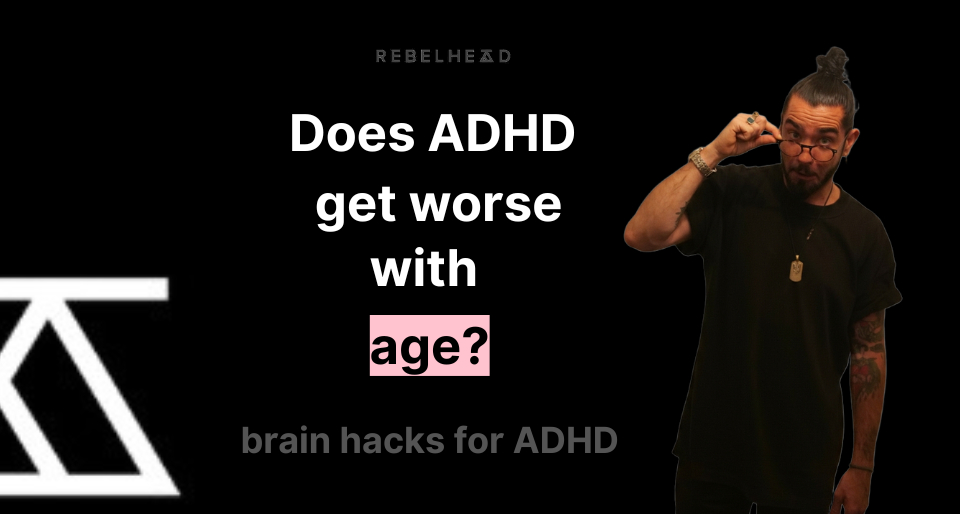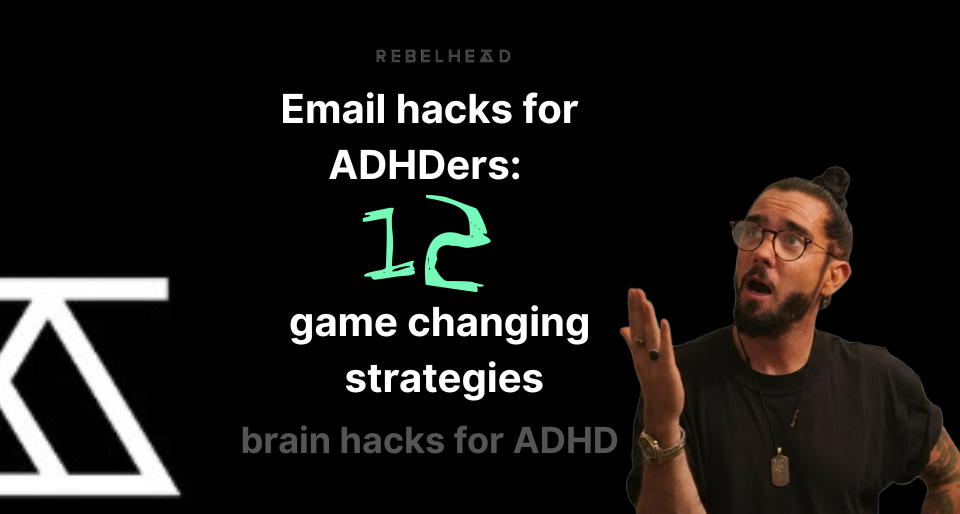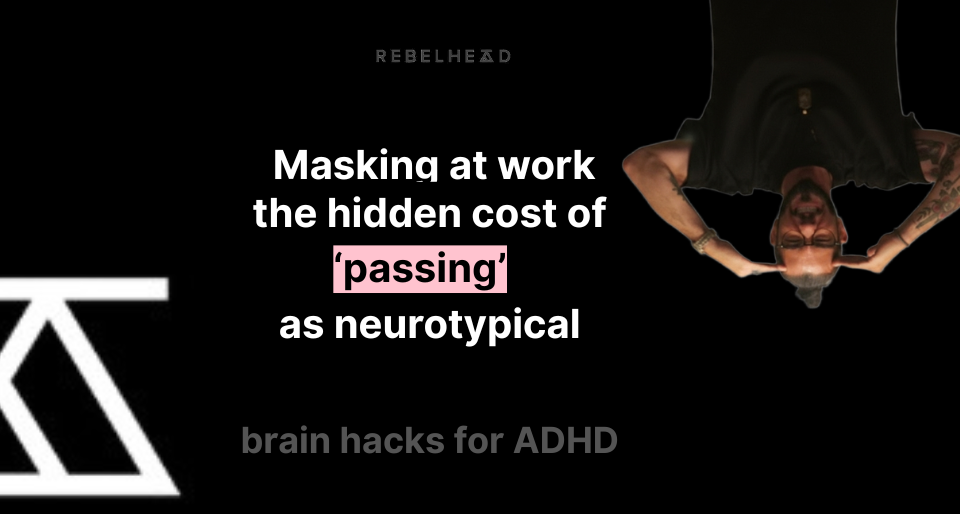There’s a question that comes up endlessly in ADHD circles, coaching calls, late-night doom scrolling rabbit holes, and quietly Googling during one of those “I have so much to do I’m just going to lie face down on the floor instead” moments:
Can ADHD get worse with age?
Short answer: it can absolutely feel worse.
Long answer: let’s walk through it, and please keep your hands and executive functions inside the ride at all times.
First important fact:
ADHD is not a degenerative condition.
Your brain isn’t slowly melting into a puddle like ice cream on a radiator. You are not losing grey matter month by month like an abandoned apple going softly mushy on the kitchen windowsill.
ADHD itself doesn’t “worsen” biologically over time in the way that some diseases do.
But.
We need to talk about reality.
Because for MANY people… ADHD absolutely feels more intense in their 30s, 40s, 50s and beyond.
And the reason is very simple:
ADHD doesn’t get worse.
Life does.
Childhood structure vs adult chaos
Think back to childhood.
- The school timetable was created for you.
- Someone cooked for you.
- Someone told you where to be and when.
- Your only real job was “show up in the correct room at the correct time.”
There was constant, external structure.
Now contrast that with adulting.
- You create your own schedule.
- You set your own priorities.
- You manage your own time.
- You have a job (or two).
- Possibly kids.
- Bills.
- A house that apparently needs constant maintenance because gravity and entropy hate us.
ADHD sits there watching the increasing complexity of life and goes:
“Oh look, new level unlocked, the Boss Fight of Adulthood. I wasn’t trained for this.”
Adult life is a long series of open tabs.
Compensating mechanisms start failing
Another reason ADHD can feel like it’s “getting worse” with age:
The tricks we used in our teens and 20s stop working.
When you’re young, you can brute-force dopamine needs with:
- adrenaline
- caffeine
- all-nighters
- novelty
- chaos
You can often get away with “I’ll do it last-minute with a burst of panic.”
But in your 30s, 40s, 50s, the body rebels.
Your nervous system starts to unionise.
The last-minute adrenaline superpowers die.
You can’t do The Panic Sprint™ forever.
You must switch from externally imposed urgency to internally generated systems.
And that is precisely the thing ADHD struggles with.
Hormones: the hidden ADHD amplifier
There’s another major piece here that almost nobody talks about enough:
estrogen is deeply connected to dopamine regulation.
So, ADHD symptoms often intensify in women at times of hormonal change:
- postpartum
- peri-menopause
- menopause
This isn’t imagined.
This isn’t a personality flaw.
This is literally a biochemical shift.
When estrogen dips, dopamine regulation gets shakier, and ADHD symptoms can jump from “annoying” to “WHY IS EVERYTHING SUDDENLY ON FIRE AND WHY CAN’T I REMEMBER IF I ATE BREAKFAST.”
For many women, ADHD diagnosis often happens in their late 30s/40s because that’s when symptoms finally break through all their lifelong coping strategies.
It’s like the brain says:
“We are no longer accepting unpaid overtime. We are now working strictly to spec. Good luck.”
The modern world makes it worse
Now we need to zoom out and look at culture.
We live in a notification-saturated, context-switching, distraction-designed environment.
Our devices are engineered to steal attention.
This matters, because ADHD thrives when:
- the environment is simple
- the tasks are immediate
- there’s one focus
But modern adult life is exactly the opposite:
- do your job
- reply to your messages
- check that Slack notification
- keep up with WhatsApp groups
- scroll Instagram for “two minutes” that becomes 40
- answer that email
- track your spending
- remember your kid needs to take 50p for a school charity thing tomorrow
- and also apparently invent dinner every single day until the end of time
So yes, ADHD can feel worse with age because adult life becomes a messy, multitasking, perpetual triage scenario.
We are not built for it.
Our ancestors had like one job:
“Walk over there, find food.”
We now have approximately 47 simultaneous jobs on any given Tuesday.
Key moments when ADHD suddenly “crashes through the surface”
Many people coast along with marginally functional coping strategies for YEARS… then something changes, and suddenly ADHD becomes brutally visible.
Common triggers:
- changing careers
- becoming a parent
- losing a partner or key support person
- moving from office to remote work
- burnout forcing a stop
- starting a business
- peri-menopause / menopause
Life changes remove the scaffolding.
And you suddenly discover how much scaffolding was holding you up.
So does ADHD get worse with age?
Again: biologically, not really.
But subjectively?
Yes, it can feel much harder to manage.
Because you have:
- more responsibilities
- fewer external structures
- less ability to brute force
- hormonal shifts
- a more distracting environment
ADHD doesn’t get worse.
The gap between needs and demands gets wider.
The reframe:
This isn’t hopeless news.
This is actually GREAT news, because it means:
You are not falling apart, you are outgrowing your old coping strategies.
Your brain is not broken.
You’re just trying to run a modern adult operating system on childhood-level structure.
Adult ADHD management requires engineering your environment and expectations.
Not willpower.
Not shame.
Not “try harder”.
More like:
- simplify systems
- use external structure tools
- reduce context switching
- build dopamine-friendly workflows
- protect your energy like it’s currency
- remove friction where possible
- get routines that run even when you don’t
The goal is not “be normal.”
The goal is:
design a life your brain can actually function in.
ADHD can feel worse with age in the same way that juggling three oranges is harder than juggling one.
You didn’t get worse.
You just got given more objects.
Adulthood is an executive function obstacle course.
So if you’re sitting there thinking:
“Why can’t I do this like everyone else seems to?”
You’re not failing.
You’re just running a different operating system, in a world not designed for it.
And the moment you stop trying to brute-force through adulthood like you’re still 19 and fueled by Red Bull and chaos…
…and instead start actually building ADHD-friendly adult systems…
That’s the moment life starts feeling lighter again.
Links:
Popular Articles:




